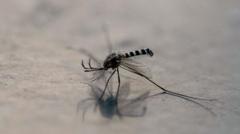Authorities in the densely populated Barangay Addition Hills, Manila, are implementing a unique mosquito bounty initiative to combat a surge in dengue fever. The village chief, Carlito Cernal, announced a reward of one peso, or less than two US cents, for every five mosquitoes turned in, dead or alive, as part of an effort to safeguard public health after recent fatalities from the disease.
Philippine Town Launches Mosquito Bounty Amid Rising Dengue Cases

Philippine Town Launches Mosquito Bounty Amid Rising Dengue Cases
A Manila community introduces cash reward program for mosquito collection as dengue outbreaks escalate.
In response to a distressing uptick in dengue cases within the community, including two student deaths, local officials have launched a temporary program that incentivizes residents to capture and submit mosquitoes. Cernal emphasized the need for action in such a densely populated area, where local health authorities have reported 44 dengue cases in the latest outbreak.
Despite receiving backlash and ridicule on social media, including jokes about "mosquito farming," Cernal remains steadfast in his approach. To date, 21 residents have participated in the program, submitting a total of 700 mosquitoes and larvae, with extermination methods such as ultraviolet light in place for live captures.
While the Philippine Department of Health (DOH) acknowledged the program's intention, they refrained from endorsing it as a scientifically proven method to reduce dengue incidence. The DOH has instead recommended traditional preventative measures such as cleaning neighborhoods, eliminating stagnant water, and proper clothing to avoid mosquito bites.
Dengue fever, endemic in tropical regions, poses a serious health threat as severe cases can lead to internal bleeding and death. The Philippine government has noted a nationwide rise in dengue cases following seasonal rains, with reported cases increasing by 40% compared to the previous year. In addition to dengue, health authorities caution that the rain has also contributed to a rise in influenza-like illnesses and leptospirosis.
Despite receiving backlash and ridicule on social media, including jokes about "mosquito farming," Cernal remains steadfast in his approach. To date, 21 residents have participated in the program, submitting a total of 700 mosquitoes and larvae, with extermination methods such as ultraviolet light in place for live captures.
While the Philippine Department of Health (DOH) acknowledged the program's intention, they refrained from endorsing it as a scientifically proven method to reduce dengue incidence. The DOH has instead recommended traditional preventative measures such as cleaning neighborhoods, eliminating stagnant water, and proper clothing to avoid mosquito bites.
Dengue fever, endemic in tropical regions, poses a serious health threat as severe cases can lead to internal bleeding and death. The Philippine government has noted a nationwide rise in dengue cases following seasonal rains, with reported cases increasing by 40% compared to the previous year. In addition to dengue, health authorities caution that the rain has also contributed to a rise in influenza-like illnesses and leptospirosis.





















